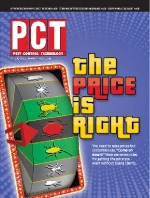 I recently saw a survey that asked ordinary Americans the two situations that would instill the most fear and panic within them. The results from this survey were interesting. The most feared situation was an insect swarm…and the second most feared situation was an IRS audit. As PCOs, I think we can handle the first item for ourselves and for our clients. But what happens if one day you go to your mailbox and pick up an envelope addressed to you with a return address from The U.S. Treasury — Internal Revenue Service stamped "Official Business." Nothing strikes an emotional chord with small business owners like the prospect of a tax audit.
I recently saw a survey that asked ordinary Americans the two situations that would instill the most fear and panic within them. The results from this survey were interesting. The most feared situation was an insect swarm…and the second most feared situation was an IRS audit. As PCOs, I think we can handle the first item for ourselves and for our clients. But what happens if one day you go to your mailbox and pick up an envelope addressed to you with a return address from The U.S. Treasury — Internal Revenue Service stamped "Official Business." Nothing strikes an emotional chord with small business owners like the prospect of a tax audit.
In this case there might be a full tax audit looming; however, many times these envelopes contain a letter stating that a math error was made or that they received a 1099 from a payer linked to your tax identification number that you failed to include on your return. In this case, you confirm the error and pay the additional tax, penalty and interest. If the IRS is not correct in their assertion, then you have the opportunity to return the letter with your explanation and wait for a response. In any event if, in fact, you do owe the additional tax and you have a reasonable explanation for the error, the IRS may abate the penalty if requested.
Be Concerned, Not Panicked. If you aren't so lucky and the letter requests a field audit, there is reason for concern, but not panic. Obviously if you practice accurate bookkeeping in your business and obey the tax laws there is little to worry about. It's now just a matter of proving that your company is in compliance. While the audit process may be intrusive it is within the IRS' right to perform an audit of your tax returns. So, as upset as you might be, you always want to be respectful to the auditor. Creating confrontation between you and the auditor is always a bad idea.
With respect to a field audit, your best course of action is to contact your tax preparer. If your return was prepared by someone other than a licensed Public Accountant, a CPA, or an Enrolled Agent you should contact one of the aforementioned to find out the best way to proceed. It is not a good idea to have a face-to-face meeting with an IRS auditor without professional representation and the aforementioned professionals are trained in audit process and procedure. Tax laws can be complex and a carefully planned audit strategy may save you much more in potential additional taxes, penalties and interest than the professional fees paid to handle the audit.
How it Works. The anatomy of an income tax audit starts with a sample period where the auditor will test the books and records to determine if they match the source documents prepared by third parties such as bank statements, cancelled checks, wire advice documents, loan documents, vendor invoices, etc.
He may also request a reconciliation of amounts reported on sales tax or payroll tax returns to the amounts recorded on your books and ultimately reported on your income tax return. The sample period is usually a month or several months. If the auditor finds exceptions in the sample such as unrecorded cash, or improper expenses that are material, or gross revenues reported on sales tax returns that don't match those reported on the books and records, he will expand the sample size to include several or all months covered by the return.
When exceptions are found, the auditor also has the right to audit all tax returns open under the statute of limitations (for IRS purposes three years, unless there is gross negligence or fraud which can be several additional years). If the audit is expanded in this manner, be prepared to have at least three years of returns examined. This is where professional tax representation is extremely important to the PCO as the tax professional will create or organize all schedules and reconciliations showing that all revenue and expense items trace and agree to the tax return and if not he will document the reasons for departure. Based on the professional's experience he will also anticipate which items create tax exposure and come up with a plan for dealing with them.
Seven Critical Areas. Based on my experience with tax audits for PCOs most accounts will be tested but the following items will be looked at most in-depth by the auditor:
- Revenues — Essentially the auditor will be looking for evidence that all your sales are properly recorded and do so through sales records that trace and agree to your bank statements and reasons for any departures.
- Employee Compensation — Compensation must trace and agree to payroll records including forms 941s, 940s, W-2 and W-3s that are filed either by yourself or by your payroll company.
- Outside Contractor's Expense — If you use outside contractors, you will need to show invoices, checks issued, 1099s issued as well as proof that the subcontractors are in fact subcontractors and not W-2 employees. The 1099 versus W-2 issue is subtle but extremely important because if in the auditor's opinion, the subcontractor is in reality an employee you may be subject to employment taxes. While the differences between sub contractors and employees are beyond the scope of this article you can get more information on the subject at www.irs.gov.
- Professional Fees — An auditor will again look for invoices, checks issued and 1099's issued for the same reason in (3) discussed previously, proving that you did in fact hire a professional rather than calling someone on your staff a professional and paying him without remitting payroll taxes.
- Travel, Meals and Entertainment — Calendars, diaries, appointment books and logs should be kept documenting any legitimate expense as this is one of the most abused deductions and without such evidence an auditor may disallow the entire deduction.
- Office Expense — You should have receipts, cancelled checks and credit card statements to substantiate office expenses. Many times auditors may look for large furniture and fixtures that were improperly expensed and should have been capitalized and depreciated over several years.
- Other Miscellaneous Expense — For most companies this is a dumping account for expenditures that cannot be categorized easily. If you have a Miscellaneous Expense account make sure the items in it are legitimate deductible expenses.
Preparation & Organization. The most important thing you can do is come prepared and be organized in category and chronology. This will build credibility with the auditor as well as make his or her job easier. While it's no guarantee of a favorable outcome, it's just human nature to respond more favorably to those who make things easier and it is no different with an auditor. The one thing you want to avoid is giving too much information. Only volunteer what is asked for and nothing more as providing too much information results in additional work for the auditor. You want to make the auditor's job as easy and efficient as possible so that you can move through the audit process with as little pain as possible.
The author is a CPA and owns an accounting firm that caters to PCOs throughout the United States. E-mail him at dgordon@giemedia.com.

Explore the October 2011 Issue
Check out more from this issue and find your next story to read.
Latest from Pest Control Technology
- Rentokil Terminix Expanded in Key Markets with 2024 Acquisitions
- In Memoriam: Joe Cavender
- Certus Acquires Green Wave Pest Solutions
- Liphatech Adds Alex Blahnik to Technical Team
- Do the Right Sting: Stinging Insect Identification, Management, and Safety
- VAGA's 8th Annual Veterans Thanksgiving Appreciation Dinner
- Clark's Blair Smith on the Response to Increased Dengue Fever Cases in Southern California
- WSDA, USDA Announce Eradication of Northern Giant Hornet from U.S.





